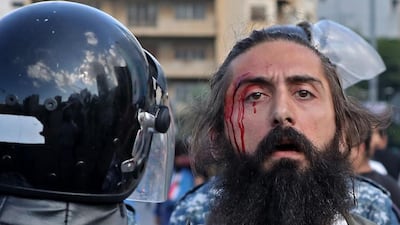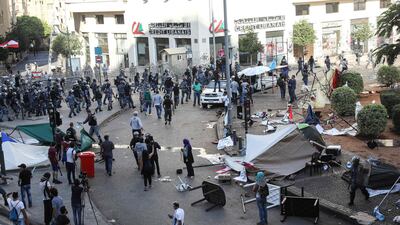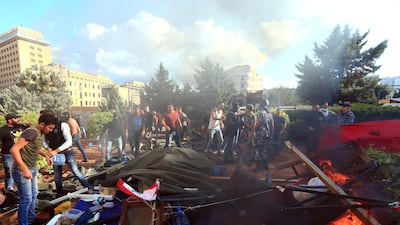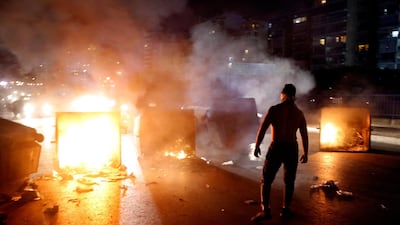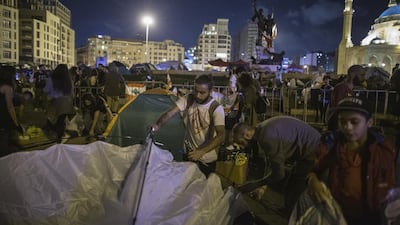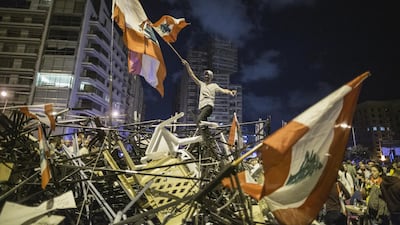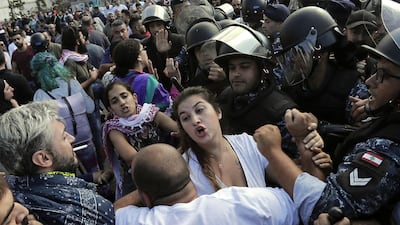Traffic was slowly returning to normal in Beirut’s city centre on Wednesday after protesters agreed to reopen roads they blocked throughout the country for the past two weeks.
But they warned that if Lebanese politicians did not send strong signals within two days that they were working on forming a new government of technocrats, the protests would return.
“We gave the president 48 hours to decide what’s going to come next,” said unemployed protester Zaki Deeb, 27, as he sat with a dozen others under tents that had been moved to the side of one of Beirut’s main motorways.
Sara, 23, said: “If nothing changes, we will close the roads again."
She said the movement might send representatives to meet President Michel Aoun on Thursday, before he is due to address the nation for the second time since mass protests started on October 17.
It remained unclear who would lead the delegation should the meeting take place.
No leadership has emerged from the anti-government protests that pushed Prime Minister Saad Hariri to resign on Tuesday.
Demonstrators accuse Lebanon’s political elite, which has governed since the end of the civil war in 1990, of corruption and for failing to provide basic services such as uninterrupted electricity.
The army asked protesters to clear the road early on Wednesday morning, which they did in most of the country.
“We opened the road for people to go to work but it’s not over,” said Hayat, a young woman standing near the ring road that connects east and west Beirut.
She had red lines painted on her face and arms.
“This is for the 'red line' of the revolution,” Hayat said. “This is our revolution and no one can touch it.”
Waving a Lebanese flag at cars driving past, Chadi Youssef, 22, told The National that reopening the roads was a favour to the Lebanese army.
“They have been defending us for the past 13 days," Mr Youssef said. "They gave us a favour and we are giving them a favour in return.
"But we’re ready at any moment to close the roads again and shut down the country. It’s not over. It’s not even close to over."
Although they were criticised for their slow response, soldiers protected protesters who were attacked on Tuesday by hundreds of supporters of Hezbollah and the Amal Movement near the ring road.
The men then entered Beirut’s downtown and destroyed tents that had been set up by protesters before troops forced them out with tear gas.
Despite protesters' defiance, their numbers have slowly dwindled since the start of the anti-government movement.
Those in Beirut said this was because many of them had to return to work while others said people feared intimidation from Hezbollah and Amal supporters.
Hezbollah leader Hassan Nasrallah firmly rejected the government’s resignation last Friday.
Mr Nasrallah urged his supporters to not join protests, saying the Lebanese had expressed legitimate grievances at first but had then been taken over by foreign powers.
The influential leader is scheduled to speak again on Friday.
Mr Hariri is ready to lead a new government on the condition that it includes technocrats, a senior official told Reuters on Wednesday, the day Mr Aoun asked Mr Hariri to stay on as caretaker prime minister.
Protesters in Beirut said Mr Hariri’s resignation was a huge step for their revolution.
“People are motivated now because they see there is hope," Mr Deeb said. "We proved that peaceful revolutions can work."
